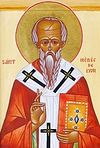

| Previous day | Next day |
| Old Style
August 23
|
Monday |
New Style
September 5
|
| 13th Week after Pentecost. Tone 3. | No fast.
|
![]() Apodosis of the Dormition.
Apodosis of the Dormition. ![]() Martyr Lupus, slave of St. Demetrius of Thessalonica (306).
Martyr Lupus, slave of St. Demetrius of Thessalonica (306).
Hieromartyr Irenaeus, bishop of Lyons (202). Sts. Eutychius (ca. 540) and Florentius (547) of Nursia. St. Callinicus, patriarch of Constantinople (705).
New Hieromartyrs Ephraim (Kuznetsov), bishop of Selenginsk, and John Vostorgov, archpriest, of Moscow, and Martyr Nicholas Varzhansky (1918).
Hieromartyr Pothinus, bishop of Lyons (ca. 177). Martyrs Severus, Memnon the Centurion, and 38 others, of Thrace (ca. 305). Ebba the Younger, abbess, of Coldingham, Northumbria, and her companions (870). St. Anthony, bishop of Sardis (10th c.). St. Nicholas the Sicilian, who struggled on Mt. Neotaka in Euboea.
Repose of Abbot Ioannicius (Moroi) of Sihastria, Romania (1944).
Thoughts for Each Day of the Year
According to the Daily Church Readings from the Word of God
By St. Theophan the Recluse

Monday. [II Cor. 8:7-15; Mark 3:6-12]
The Lord forbade both people and demons to praise Him when he was on the earth, but required that they believe in Him and fulfil God’s commandments. The same law is with the Lord now, and will be at the judgment: “Not every one that saith unto me, Lord, Lord, shall enter into the kingdom of heaven; but he that doeth the will of my Father which is in heaven” (Matt. 7:21). This is why in church the [doxology] begins with, “Glory to God in the highest,” and toward the end it says, “heal my soul…teach me to do Thy will.” Without this, praise of God has no worth. For then it does not proceed from the soul, but is only sent up from the tongue in alien words, and that is why the Lord pays no attention to it. One must arrange things so that others see our deeds and praise the Lord, so that our life will be praise to God, for He acts all in all, if only you do not hinder; it is to Him that praise for one’s deeds ascends. Each person must become the fragrance of Christ; then even without praise there will be unceasing glorification of the Lord. The flower of a rose does not utter a voice, but its fragrance spreads far in silence; this is how all Christians ought to live.


